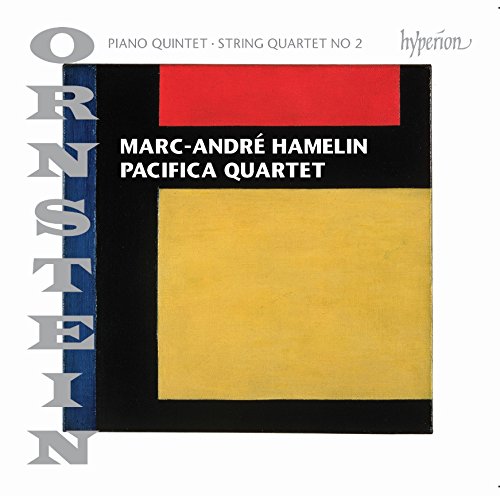ORNSTEIN Piano Quintet. String Quartet No 2
View record and artist detailsRecord and Artist Details
Composer or Director: Leo Ornstein, Marc-André Hamelin
Genre:
Chamber
Label: Hyperion
Magazine Review Date: AW2015
Media Format: CD or Download
Media Runtime: 72
Mastering:
DDD
Catalogue Number: CDA68084

Tracks:
| Composition | Artist Credit |
|---|---|
| Quintet for Piano and Strings |
Leo Ornstein, Composer
Leo Ornstein, Composer Marc-André Hamelin, Composer Pacifica Quartet |
| String Quartet No 2 |
Leo Ornstein, Composer
Leo Ornstein, Composer Pacifica Quartet |
Author: David Fanning
Having given us a solo Ornstein disc back in 2002 (10/02), Marc-André Hamelin here offers the hypertrophic Piano Quintet. Composed in 1927, by which time the Russian-born, American-resident maverick had got his wild oats well and truly out of his system (as in the pre-war Suicide in an Aeroplane), this is a glorious confection of Stravinsky, Ravel, Rachmaninov and East European folk idioms that almost makes up in enthusiasm what it so conspicuously lacks in discipline. Evidently counterpoint was on the list of theoretical subjects Ornstein had no time for. As a result, when he adds super-luxuriant harmonies and pianistic cascades to the mix, he merely reinforces the impression of a massively talented student rather than a mature composer (for a counter-example, compare the similarly monumental but far more carefully crafted Taneyev Quintet). Pianistically Hamelin has a considerable edge over his fellow Ornsteinian Janet Weber, as does Hyperion’s recording quality over the boominess of its New World rival.
In the Quintet’s world of elementary melody and accompaniment, amplified by virtuoso texture and spiced by additive-rhythm ostinato, the piano is king. The Pacifica Quartet have more chance to show their mettle in the less extravagant Second String Quartet, probably composed shortly after the Quintet (most Ornstein dates are more or less conjectural). Once again, the influence of Ravel is to the fore, and once again the comparison shows up Ornstein’s essential naivety – an engaging or frustrating quality, according to taste. Both pieces are excellent examples of how far a composer can go on intuition, energy and talent alone, which is to say a good deal further than those lacking such qualities but nowhere near as far as those who take the trouble to learn their craft thoroughly.
Discover the world's largest classical music catalogue with Presto Music.

Gramophone Digital Club
- Digital Edition
- Digital Archive
- Reviews Database
- Full website access
From £8.75 / month
Subscribe
Gramophone Full Club
- Print Edition
- Digital Edition
- Digital Archive
- Reviews Database
- Full website access
From £11.00 / month
Subscribe
If you are a library, university or other organisation that would be interested in an institutional subscription to Gramophone please click here for further information.




